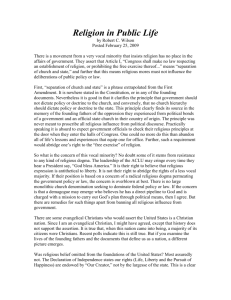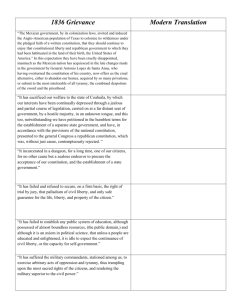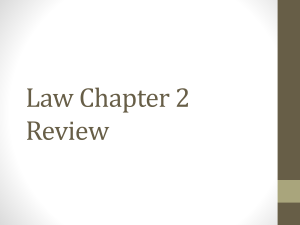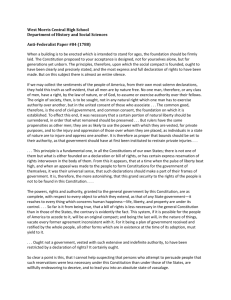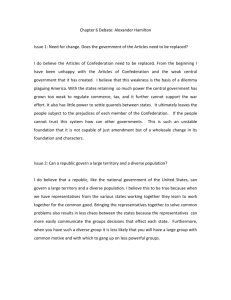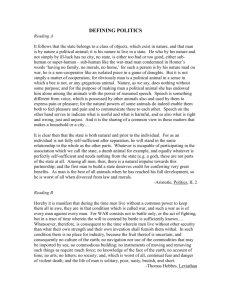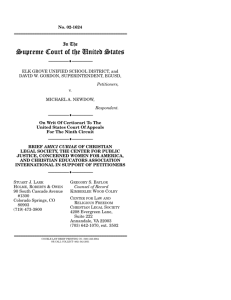Publicationnext
advertisement
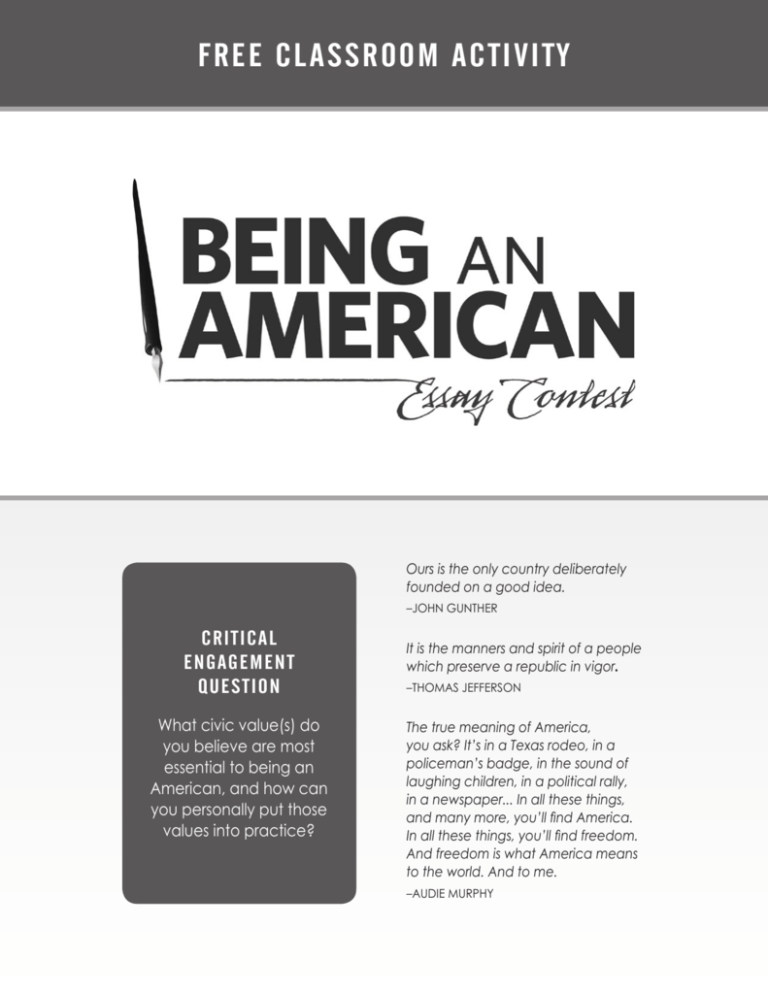
FREE CL ASSROOM ACTIVITY Ours is the only country deliberately founded on a good idea. –JOHN GUNTHER CRITICAL ENGAGEMENT QUESTION What civic value(s) do you believe are most essential to being an American, and how can you personally put those values into practice? It is the manners and spirit of a people which preserve a republic in vigor. –THOMAS JEFFERSON The true meaning of America, you ask? It’s in a Texas rodeo, in a policeman’s badge, in the sound of laughing children, in a political rally, in a newspaper... In all these things, and many more, you’ll find America. In all these things, you’ll find freedom. And freedom is what America means to the world. And to me. –AUDIE MURPHY OVERVIEW The United States is said to be the only nation founded not on the ethnicity of its citizens, but on their shared commitment to certain ideas and values. Recent immigrants who share these ideals are as fully American as those who can trace their ancestry to the men who signed the Constitution. But what are these ideals that make us Americans? In this lesson, students will explore the ideas and values that unite us. OBJECTIVES Students will: • Identify values that unite us as Americans • Understand how various Americans in history have exemplified those values • Analyze how those values are embedded in the Founding documents • Reflect on the ways they can exercise those values in their every day lives • Appreciate the United States as a nation based on the shared commitment to these values STANDARDS Kansas: Civics/Government 1,2,3,4; History 1,2,3,4 Texas: US 1, 7, 17, 19; USG 8, 9. 14, 15, 16, 17 Virginia: VUS.4, 5, 14; GOVT.1, 2, 4, 7, 11, 17 BACKGROUND/HOMEWORK A. Write the overview quotations (on the front page of this activity) on the board. Have students read them all and then focus on the Gunther quotation. What “idea” is he referring to? Discuss this question as a large group, emphasizing that there will be a number of correct responses. You may also use the “Being an American Quote Bank” for more quotations. B. Tell students that to prepare for tomorrow’s discussion, they will hunt through American history from the Founding Era to the present day to find examples of that “idea.” (They can skim their textbooks or do Internet research; encourage students to go beyond individuals they know personally.) Divide the class into group A and group B. Group A should select and investigate a Founding document (from the years 1760-1800) to identify an “idea” of America. Group B will select an individual from American history who has personified the “idea” of America in their view. They should come to class next time prepared to share and discuss what they discovered. ANTICIPATORY ACTIVITY [10 minutes] A. Divide students into pairs made up of one student from Group A and one from Group B. B. Have students discuss the Founding documents and individuals they learned about for homework. C. Reconvene the class and share responses as a large group. What kinds of ideas and values were mentioned most frequently? How did the individuals from American history exemplify them? ACTIVITY [20-30 minutes] A. Ask students to brainstorm and discuss a list of values embodied in the Founding documents. B. Make a list on the board as students volunteer their thoughts. The list would be extensive, but examples might include: compassion, consideration, courage, diligence, entrepreneurship, federalism, future-mindedness, honesty, humility, justice, industry, initiative, integrity, liberty, limited government, majority rule vs. minority rights, moderation, natural or inalienable rights, reliability, popular sovereignty, presumption of innocence in trials, public service, religious freedom, representative government, respect for others, respect for private property, respect for the rule of law, responsibility, separation of powers, thrift, volunteering, and other ideas. C. Encourage students to think critically to conclude ANSWER KEY D. After students have made their determinations, If you decide to use the Being an American Quote Bank, here are some suggested values that your students might associate with the quotes. which values and ideas are most essential the idea of being an American. have them write their idea(s)/value(s) at the top of a piece of paper. E. Have them then make a T-chart on their papers, labeling one side “Ways I Have Exercised or Supported This Value” and the other “Ways I Can Exercise or Support This Value in the Future.” F. While students are working, write the following quotation on the board: “The preservation of the sacred fire of liberty, and the destiny of the republican model of government, are justly considered deeply, perhaps as finally, staked on the experiment entrusted to the hands of the American people.” –George Washington G. Have students share their responses and discuss again as a large group. Discuss responses in terms of the Washington quotation. How can students live up to his challenge in their daily lives? CULMINATING ACTIVITY/HOMEWORK Have students answer the following question in an essay of no more than 500 words: What civic value(s) do you believe are most essential to being an American, and how can you personally put those values into practice? To support this personal response, reference a Founding document as well as a figure from American history exemplifying the civic value(s). A well-written essay will completely adhere to the topic and fully answer the question. These essays approach the topic with original and lively prose. They include a detailed discussion of a civic value(s); a thoughtful personal response to the value(s); an outstanding critique of the value (s) as it appears in at least one Founding document; 1. 2. 3. 4. 5. 6. 7. 8. 9. 10. 11. 12. 13. 14. 15. 16. 17. 18. entrepreneurship, liberty, natural and inalienable rights, respect for private property justice, limited government, natural and inalienable rights, popular sovereignty compassion, courage, futuremindedness, justice, liberty, popular sovereignty, representative government, respect for rule of law federalism, majority rule v. minority rights, popular sovereignty, public service, representative government limited government, moderation, separation of powers federalism, liberty, limited government, majority rule v. minority rights, respect for the rule of law, separation of powers consideration, liberty, limited government, initiative, natural or inalienable rights, respect for rights of others, religious freedom entrepreneurship, industry, natural or inalienable rights, respect for private property, presumption of innocence in trials federalism, integrity, natural or inalienable rights, responsibility future-mindedness, public service, reliability, responsibility, volunteering, integrity, liberty, limited government, natural and inalienable rights, respect for rule of law courage, diligence, future-mindedness, liberty, natural and inalienable rights, public service consideration, honesty, liberty, moderation, natural or inalienable rights majority rule v. minority rights, moderation, popular sovereignty, respect for others diligence, future-mindedness, liberty, public service, reliability representative government humility, integrity, limited government, moderation, respect for others, responsibility compassion, consideration, futuremindedness, industry, initiative, justice, public service, responsibility, thrift, volunteering humility, justice, liberty, moderation, thrift, respect for private property BEING AN AMERICAN QUOTE BANK Use these statements to begin your thinking about American civic values. Which values are referred to in each of the quotes? How are these values reflected in American history or American life today? 1. We hold these truths to be self-evident, that all men are created equal, that they are endowed by their Creator with certain unalienable rights, that among these are life, liberty, and the pursuit of happiness. –Declaration of Independence 2. . . . that to secure these rights, governments are instituted among men, deriving their just powers from the consent of the governed. –Declaration of Independence 3. We, the people of the United States, in order to form a more perfect union, establish justice, ensure domestic tranquility, provide for the common defense, promote the general welfare, and secure the blessings of liberty for ourselves and our posterity do hereby ordain and establish this Constitution for the United States of America. –The Preamble to the Constitution 4. The House of Representatives shall be composed of members chosen every second year by the people of the several states. . . –Article I, Section 2 of the Constitution 9. The powers not delegated to the United States by the Constitution, nor prohibited by it to the states, are reserved to the states respectively, or to the people. –Tenth Amendment 10. The consciousness of having discharged that duty which we owe to our county is superior to all other considerations. –George Washington 11. Government should be formed to secure and to enlarge the exercise of the natural rights of its members; and every government, which has not this in view, as its principle object, is not a government of a legitimate kind. –James Wilson 12. Liberty must at all hazards be supported. We have a right to it, derived from our Maker. But if we had not, our fathers have earned and bought it for us, at the expense of their ease, their estates, their pleasure, and their blood. –John Adams 13. Without freedom of thought there can be no such thing as wisdom; and no such thing as public liberty without freedom of speech. –Benjamin Franklin 5. He [the President] shall have power, by and with the 14. In republics, the great danger is, that the majority 6. The Constitution. . . shall be the supreme law of the 15. The preservation of the sacred fire of liberty and advice and consent of the Senate, to make treaties, … –Article II, Section 2 of the Constitution land. –Article VI, Section 1 of the Constitution 7. Congress shall make no law respecting an establishment of religion, or prohibiting the free exercise thereof; or abridging the freedom of speech, or of the press; or the right of the people peaceably to assemble, and to petition the government for a redress of grievances. –First Amendment 8. The rights of the people to be secure in their persons, houses, papers, and effects, against unreasonable searches and seizures, shall not be violated, and no warrants shall issue, but upon probable cause. –Fourth Amendment may not sufficiently respect the rights of the minority. –James Madison the destiny of the republican model of government are justly considered, perhaps as deeply, perhaps as finally, staked on the experiment entrusted to the hands of the American people. –George Washington 16. If men were angels, no government would be necessary. –James Madison 17. Every member of society is in duty bound to contribute to the safety & good of the whole. –George Mason 18. No free government, or the blessings of liberty, can be preserved to any people, but by a firm adherence to justice, moderation, temperance, frugality, and virtue, and by frequent recurrence to fundamental principles. –George Mason

